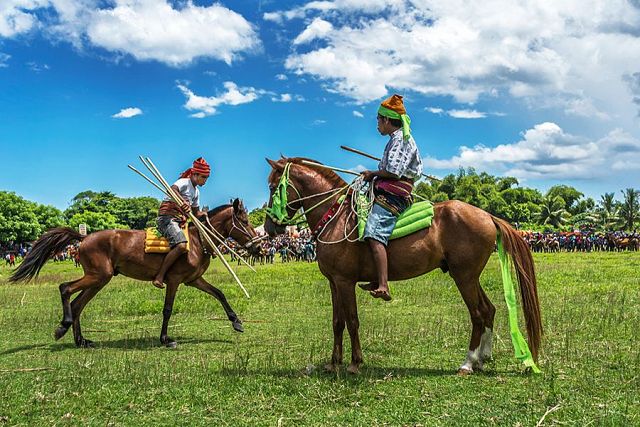
Every year in February and March, the island of Sumba hosts the Pasola Festival: an ancient ritual war game. Men in traditional costumes engage in battles on horseback to shed blood on the ground, which is believed to bring forth a bountiful harvest and honor the Marapu gods.
The festival takes place in the vicinity of the villages of Kodi, Lamboya, and Wanokaka. Thousands of people gather on the slopes of nearby hills. It's a very colorful and spirited show, and for many, it's the main event of the year, prepared for months in advance. While Pasola has been without casualties in recent years, tradition dictates that warriors should fight fiercely, without sparing themselves or their opponents, as the main goal, dream, and honorable duty of each participant are to nourish the earth with their blood and thus fertilize it.
Pasola lasts for several days, filled with ritual activities and solemn ceremonies. It's the only time when tourists can visit unique ancient warrior tombs from the megalithic era and witness a female dance of mourning for the fallen. In addition to this, there are dozens of shamanic ceremonies with chanting, dancing, and mystical trance throughout the festival days. In the evenings, grand feasts take place in all the villages, where hundreds of buffaloes and pigs are slaughtered and then roasted on giant bonfires.
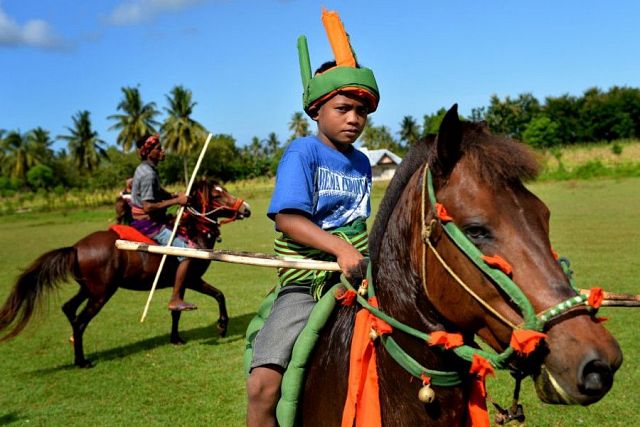
High up in the mountains, on the roof of a monumental megalithic-era burial site, three shamans sit with crossed legs, gazing down at the moonlit valley. They are singing. The slow, deep howling dissolves into the pre-dawn silence. This is an annual call to the spirits of Niale, who manifest themselves as sea worms and octopuses teeming off the shores of Sumba, a tiny island in Eastern Indonesia. When they arrive, the shamans will determine if the next year will be fertile. This ceremony is a central element in the annual ritual cycle, which will conclude a few hours later with a bloody horseback battle among the villagers themselves.
The people of Sumba are skilled in divination, as they still honor their centuries-old culture of sacrificial offerings. They read signs in the entrails of chickens and dogs, ritually slaughter pigs, buffaloes, and horses to provide their deceased ancestors with livestock in the afterlife. They also shed each other's blood in clan wars and ritual battles with the same enthusiasm.
They belong to one of the last megalithic cultures on Earth; the dead coexist with the living in giant stone tombs adorned with esoteric symbols. The animistic belief system of Marapu thrives as if there were no modern civilization, which is why the people of Sumba are unafraid of death; they perceive it as a doorway to eternity, where their ancestors await them.
The Pasola ceremonies take place every year in February and March. It's an intoxicating mix of mystical excitement, sacrificial offerings, and ritual violence set against the backdrop of abundant food, palm wine, and the availability of women. Thousands of people gather on a deserted beach at night for the Pasola matches, a form of Indonesian no-holds-barred boxing.
The fighters' hands are wrapped with stiff palm leaves with thorns on the edges, and that's pretty much their only protection. They pummel each other to the sound of the crowd's breath, illuminated only by the brilliant white moon and billions of stars. Lanterns and any artificial lighting are strictly forbidden. Noses are broken, skulls are fractured, but as soon as dawn breaks, everyone sits on the sand and sings ancestral songs of peace.
After the shamans have seen the spirits, the Pasola battle begins. Two rows of fighters, each consisting of fifty people in traditional headgear, armed with a bundle of wooden spears, riding trained warhorses adorned in splendor, charge at each other like knights in a tournament, like in a real war. Just when it seems that the collision is inevitable, that there will be no less than a hundred casualties, the riders suddenly rein in their horses and hurl spears at each other while still in motion.
The skill and agility of the riders are astonishing – they ride at breakneck speeds without saddles, fully leaning in, clutching the rope reins in one hand and spears in the other. The best among them can not only evade enemy projectiles almost without moving, without lowering their heads, solely by skillfully controlling the horse but also catch spears in the air with a show of nonchalance and send them back. Nevertheless, many participants suffer serious injuries or fall off their horses, much to the delight of their opponents.
But that's the point. Blood sings sweet songs for a true Sumbanese. Without the blood of sacrifices, the rice cannot grow, just as it cannot grow without water and sunlight. To die on the battlefield is a great honor and a gift to the entire society.
However, strangely enough, the meaning of the festival is not in violence but in peace. All clan conflicts are resolved in the Pasola battle. There is a version that this war game was invented as an alternative to endless civil wars, so that the population would not annihilate itself completely. The game has strict rules, for example, it is forbidden to strike the head or ride over a fallen opponent.
Despite the fact that the Sumbanese are faithful to their rituals and traditions, the world around them is changing. Sumba is advertised as the next jewel in Indonesia's tourism crown, and the gold rush has already begun. Many predict that this tiny island, which few have heard of, is our next Bali. Perhaps the shamans have already seen the signs...
The shamans of the Ratu clan conduct a nighttime ceremony before the start of the festival. Although the local population has long been successfully converted to Christianity, the shamans still wield significant influence, and no one thinks of driving them away. No wonder! While Jesus, of course, loves everyone, the local spirits are responsible for the harvest, and they need to be appeased.

Before dawn, the shamans go to the ocean and pray for good weather and a successful fishing. Jokes aside, the result of shamanic prayer couldn't be more evident: thousands of octopuses, mollusks, and marine worms approach the shore. The residents of the nearby villages will be catching them all morning.

As is customary in most ancient patriarchal cultures, women are not allowed to participate in the war. Their role is to inspire the participants and conduct rituals for the ancestors.
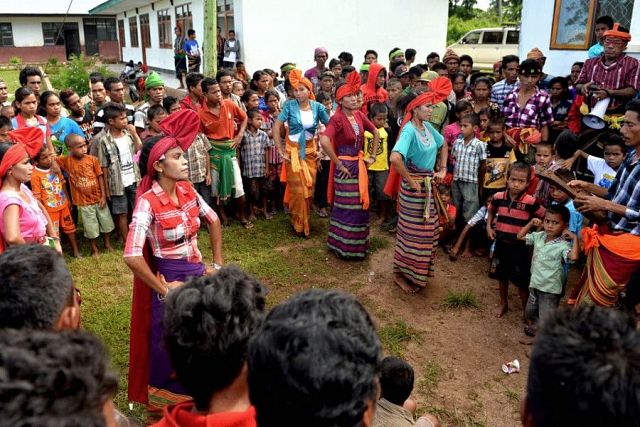
Preliminary inspection of participants: checking determination, attire, and weapons.
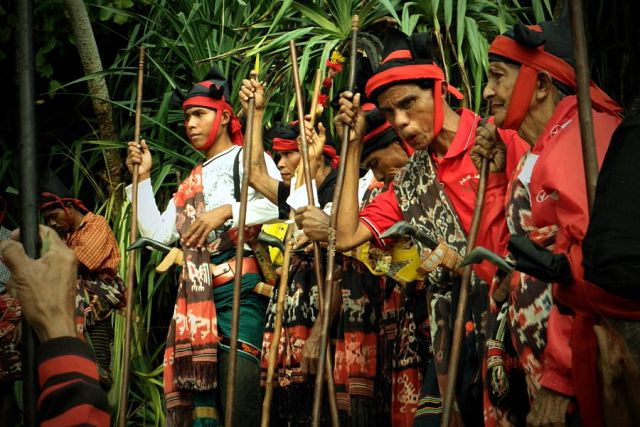
Before heading out to the battlefield, participants warm up their horses.

The stars of the show prepare in special community houses, where numerous assistants and fans help in any way they can to boost their spirits.
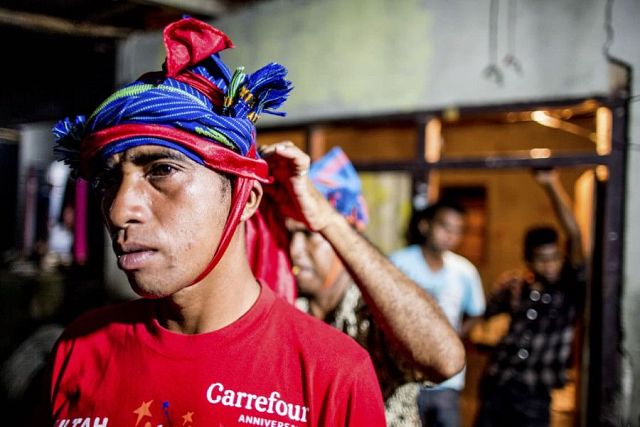
Those who didn't excel in previous battles must do everything themselves.

After the shamans, Catholic priests come into play. In Sumba, like in most neighboring small islands, all priests are women. They are trained at the Catholic University in Ambon. According to strange logic, male priests irritate the congregation, while women do not. The cult of the mother, characteristic of most ancient cultures, helped local residents somehow reconcile with Catholicism.

This man is not just a star of the show; he is the Madonna, Sting, and Barack Obama of this festival. He has hundreds of "killed" enemies to his name and the fewest falls. This year, once again, he will be the first to throw his spear and thus begin the battle.
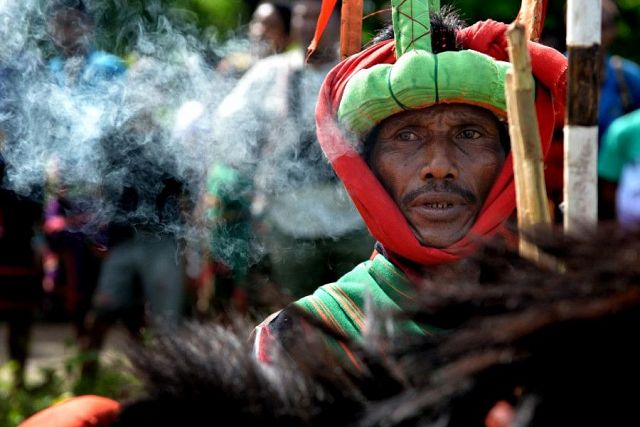
The smaller stars earn the love of the audience as best they can.

Right after the first ritual throw, the field becomes crowded, with people and horses mixing together. The youth wants to show themselves before the experienced warriors enter the battle.
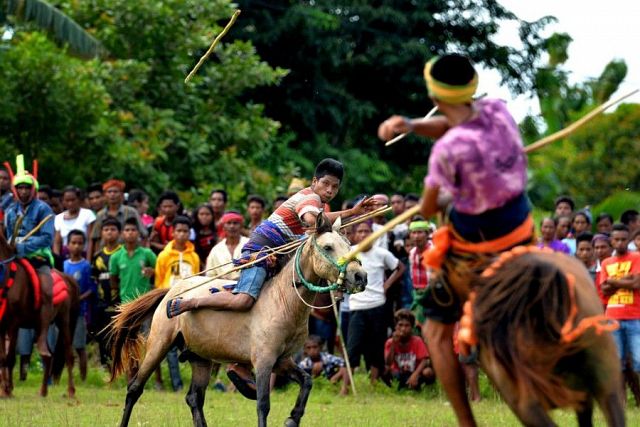
Looking at this commotion, it's hard to believe that fighters on each side follow a specific tactic, like football players.
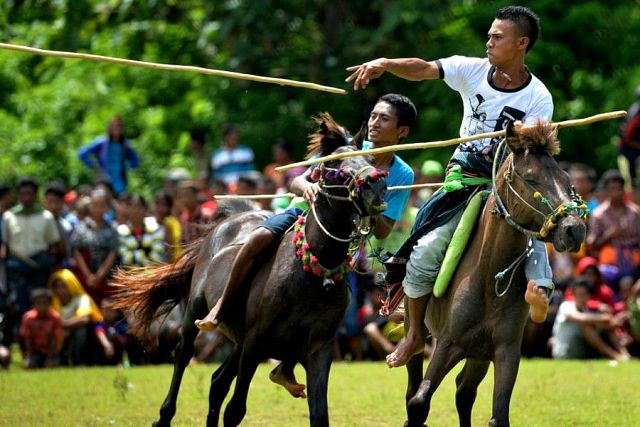
In recent years, the festival has been held without fatalities. The Indonesian government has banned real killings, and the police and a special forces unit with automatic weapons oversee this. But blood must still be shed, that's the whole point! The more injuries, the better for the harvest.
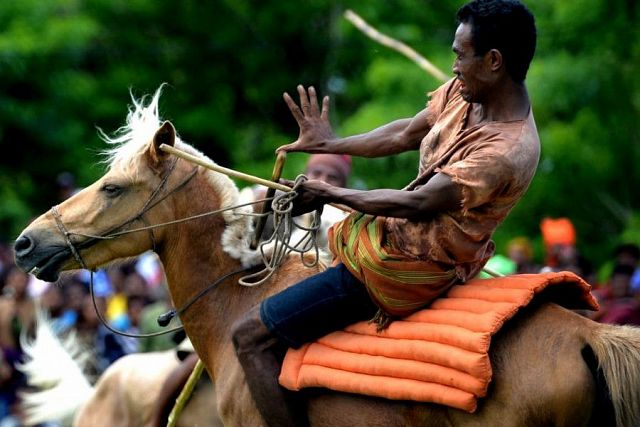
The second stage involves experienced fighters who finish off the youngsters. After the novices are removed from the field, the real big game begins: the art of controlling the horse in battle, throwing spears, and driving the opponent's horse.

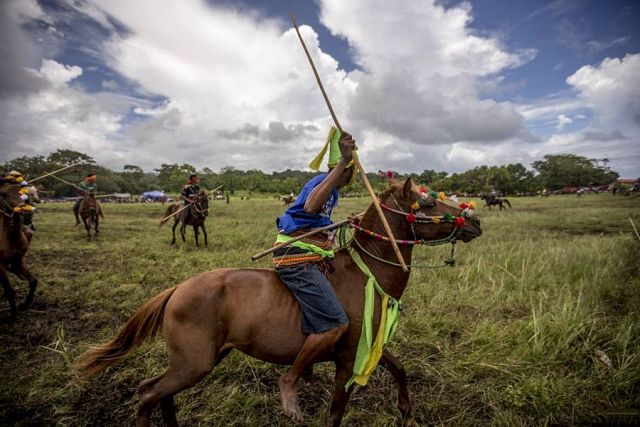
The roar of the crowd, a successful throw, the sweet taste of victory over the enemy.
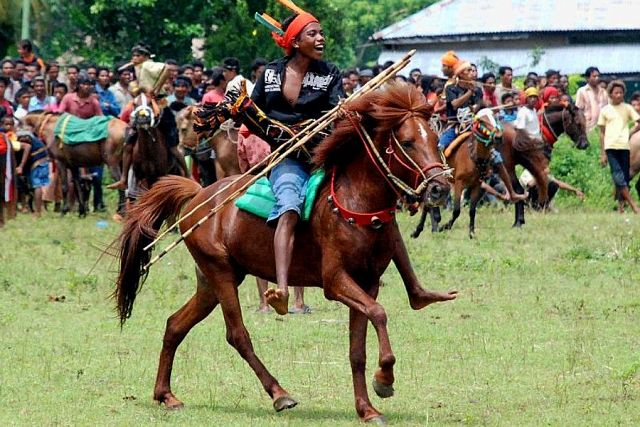
The "fallen" ones leave the field, they need to calm the horses and come to terms with defeat.

As long as you're on a horse and can throw a spear, you remain a man and a warrior.
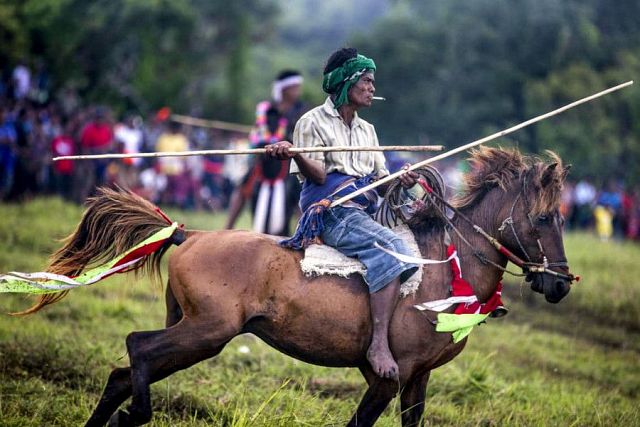

The third stage, when the battle gets serious. The audience is satisfied, soon there will be bloodshed.



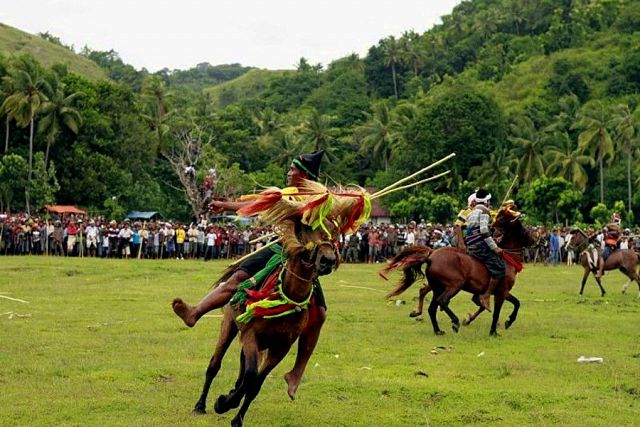
Suddenly, the riders orderly leave the field, the cavalry battle is over, and a free-for-all begins. The fighters themselves also dismount from their horses, leave them to their assistants, and quickly return to the field. Participants and spectators are caught up in a battle frenzy; ancient traditions demand blood. Many are armed with real knives and machetes. In a couple of minutes, the army and police will intervene, but the island will have already tasted blood.

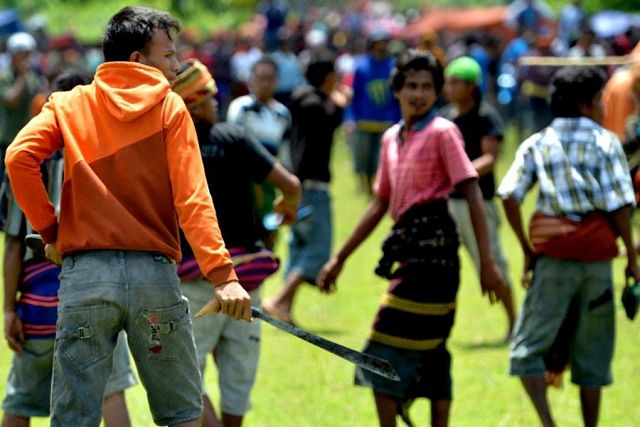
When the battles are over, it will be time for a feast. Men prepare to slaughter buffaloes and pigs.
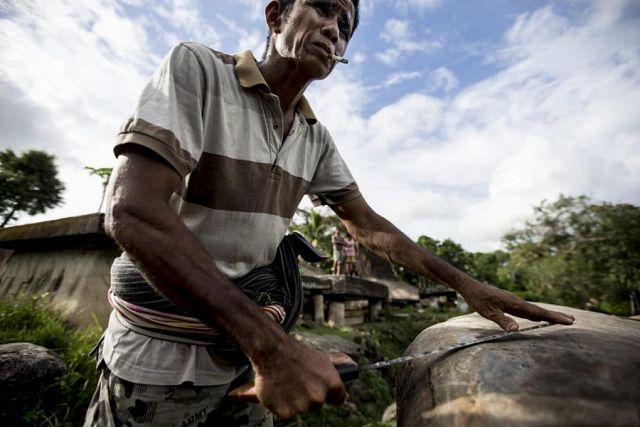
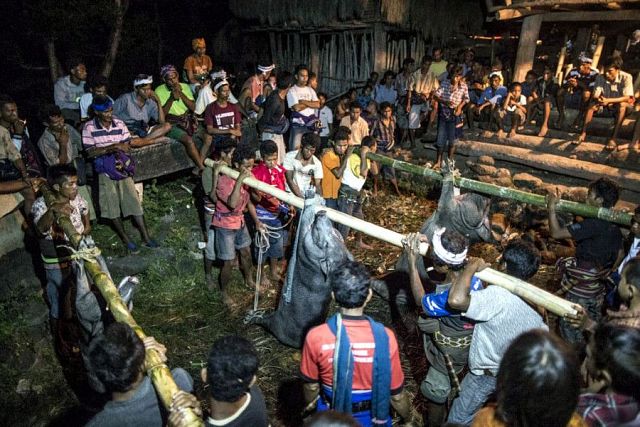

Sumba has only recently appeared on the world tourism map. You can reach it from Bali in just over an hour on a small propeller plane with Wings Air, with a layover in Sumbawa, or by ferry.
Tourist facilities are still in their infancy. Except for one luxury resort in the southern part of the island and a few very basic guesthouses, there is no tourist accommodation on the island. There are no bars or shops, and after sunset, public life comes to a standstill.
You can add one right now!